- Home
- Salman Rushdie
Quichotte Page 7
Quichotte Read online
Page 7
“Your fifty percent of the estate.”
“And what’s your share? Nine hundred and fifty percent?”
“I see. You’re accusing me.”
“Damn right I am. You offer me peanuts and tell me they’re diamonds. You give me a cheap forgery and say it’s the Mona Lisa. You send me a drizzle and say it’s a monsoon. You hand me a sack of garbage and tell me it’s half of a fortune. You’re a swindler. You’re such a greedy swindler that you don’t even bother to make your swindle look convincing. Maybe I’ll call a press conference and tell the world how the eminent Sister, the prominent human rights warrior, the champion of the underdog, the British BAME communities’ fucking female knight in fucking shining armor, the fucking brown-skin Lancelotta, the Pakis’ best friend, the honorary West Indian Indian, the go-to woman when African countries need a constitution written, the free speech heroine, the evenhanded opponent of religious fanaticism and white racism, the postcolonial Boadicea, is a two-bit crook gobbling up the family inheritance. Give me the rest of my fucking money or I’ll see you on the front page.”
Anger was her weakness. She knew it. She buried it deep, down at the roots of her being, because if she turned it loose she turned green, burst out of her shirt, and became the Incredible Hulk. It didn’t often escape. This time it did. Brother’s anger was amateur night compared to hers. He had brought a pocketknife to a gunfight. When she began to talk, when the Hulk roared out of her throat, he fell silent. She did not hold back. The threat he had made was a serious one. For her own flesh and blood to go public with such an accusation would be immensely damaging. The mud would stick and her political opponents, of which there were many, given the high-profile public cases she fought, would relish the chance to attack her. This was the age of the kangaroo court of instant opinions, in which an accusation was frequently the same thing as a guilty verdict. She couldn’t afford to go easy on him. She needed to destroy his will to go forward, to install a real ineradicable terror in his heart, strong enough to make him back down and keep his money-grubbing mouth shut forever. She spoke for eleven minutes without stopping. She could feel his fear oozing all the way down the phone connection, digital fear, Wi-Fi fear, twenty-first-century fear. Finally she told him, “Be in no doubt that I will do whatever it takes to defend my good name. Whatever it bloody well takes.” Then she hung up.
There was no press conference. There was no further communication. And seventeen years went by, and here she was, drinking her dirty martini (up, with olives), waiting for her eminent guests, and lost, all of a sudden, in the past.
* * *
—
TO BE A LAWYER in a lawless time was like being a clown among the humorless: which was to say, either completely redundant or absolutely essential. It wasn’t clear to her, these days, which of the alternatives best described her. Sister was an idealist. She believed in the rule of law as one of the two foundations of a free society, along with free expression. (This was the kind of remark you didn’t make too often in white society in London for fear of sounding self-righteous, “preachy.” It was also a remark which, if made in brown or black circles, might elicit a loud series of disbelieving horse-laughs.) As a result the direction the world had taken in her lifetime was upsetting. Both the law and liberty were everywhere under attack. The thuggish deterioration of Indian society both allowed her to believe ever more fervently that she no longer wanted anything to do with that increasingly horrible country, and hurt more deeply than she cared to admit. The continuing American convulsion disgusted her, and the vulnerability of immigrants to abuse and worse was a growing part of her daily agenda here at home. On a bad (three-martini) day she came close to despair, telling herself that after all these years she was obliged to admit that she had misunderstood the country of which she was now a citizen and which she thought of as her country. She had deeply believed it to be a reasonable place, broad-minded, easygoing, and good to live in, and now she discovered that it was also—or not also, but in fact—narrow-minded, delusional, and, for people lacking the great virtue of acceptable skin color, not comfortable to live in at all. When she entered this kind of mood her husband the judge—the High Court judge Godfrey Simons—was a pillar of strength. Here he was now, coming down the stairs from the upper floor, where he had been getting ready to greet their guests. He was wearing the floor-length Vivienne Westwood gown, the pearls, and the new high heels tonight. It was a big night for his wife and he wanted to look his best for her. She applauded him softly as he descended.
“You look resplendent, Jack,” she told him. “Dignified, glamorous. And the shoes!”
“Thank you, Jack,” said the judge. “Glamor and dignity is what we strive for.”
They called each other “Jack” instead of “dear” or “darling” or “honey.” It was their little private thing. They had so much in common. They had the same favorite drink, they always chose the same dishes in restaurants, and when they were asked about their preferred books they answered identically, without conferring. The Magic Mountain, Madame Bovary, Don Quixote. No English books? Oh, if you want an English writer, then there’s only one, they might reply, and then they might cry out, in unison, “Trollope!” They had the same taste in dresses too. Calling each other by the same name made perfect sense.
Outside their home the judge wore pin-striped Savile Row suits and bespoke shoes and with his full head of silver hair he looked splendidly judicial. Even at home, most of the time, he dressed conventionally—a short-sleeved polo shirt and slacks. The dresses and jewelry only came out when they entertained. He never wore a wig. He wasn’t trying to be a woman. He was simply a man who liked wearing women’s designer clothing from time to time. Everyone knew this and nobody drew attention to it. After all, it was widely rumored that Prince Charles, a great admirer of the Islamic world, received guests at Highgrove dressed like an Arab sheik. This wasn’t so different, and much more English.
The doorbell rang. “Ready, Jack?” he asked Sister.
“Ready, Jack,” she replied.
The great hall at Middle Temple—“her” Inn of Court—was the place where, in 1601, perhaps even on January 6, the Lord Chamberlain’s Men, Shakespeare’s “playing company,” staged the first ever night of Twelfth Night before Queen Elizabeth I, Gloriana herself, and a company of VIP guests, some of whose names were echoed in the names of the play’s characters. And Shakespeare himself might have played Malvolio. Four hundred years later Sister had been present in the great hall when a prominent theater company restaged scenes from that original production as the centerpiece of a fundraising gala. She had been seated at a table with various luminaries of the West End stage and, on her right, a loud, fleshy Ukrainian sub-oligarch who claimed to love Shakespeare (“Have you seen Innokenti Smoktunovsky in Russian film Gamlet? No? Disappointing!”), did not understand the play (“But there are not twelve nights in this story! Disappointing!”), disapproved of all the cross-dressing, making a series of transphobic remarks (“Men instead of women! Disappointing!”), and thoroughly ruined her evening. The next day she called her host, the theater company’s financial director, to thank him, a little coolly, for the invitation. “No, thank you,” he said. “Why thank me?” “Because this morning the disappointing person you talked to all evening wrote us a check for nine hundred thousand pounds.” She had been younger then and people told her she was beautiful, though she had never been convinced of that. Anyway, this had become a favorite anecdote of hers, and here she was telling it to the gathering of grandees who had assembled to offer her a seat on the crossbenches of the House of Lords and, shortly thereafter, the job of speaker in the British upper house. She would be only the second woman to be so chosen. It was if she had ascended Everest alone and without oxygen. And at the very instant that she stood upon this pinnacle, she found herself thinking about Brother, because it suddenly occurred to her that Twelfth Night was about a brother and sister who were sepa
rated, each believing the other to be dead. And after many tangled tales they were joyfully and lovingly reunited. There was a lump in her throat as she considered her own very different situation. Her asshole brother who had never apologized for his slanderous words, never come close to apologizing. Her loser brother struggling to make a living from his fifth-rate books and fearing, no doubt, that as publishing belts were tightened in these hard times his mediocre career might grind to a halt. Her brother who treated her as if she were dead. (Most of the time, she conceded, she returned the compliment.) What did he think he was doing intruding on her big night? He was a ghost, worse than a ghost, a living phantom. Why had he chosen this of all evenings to haunt her and rain on her parade?
As she emerged from this brief reverie a quarrel broke out among the assembled Lords. The youngest peer, the British-Nigerian baroness Aretta Alagoa, was calling to mind one of the early defining moments of Sister’s career. In the early 1980s a fire had broken out in cheap public housing in North London and seven families had died. After that two hundred or so people had stormed and occupied their local town hall to demand safe, habitable housing for themselves and their children immediately. Sister had gone in there to offer her legal services and had immediately become the spokesperson for the group, whose media appearances were highly effective, and had forced the borough council to act. “You became a star for us youngsters then,” Aretta Alagoa told her, “so for you to become the first POC to be speaker in the Lords would be a big, big thing.”
The assembled peers were a cross-party group, intended to show Sister that her prospective appointment had support all the way across the political spectrum. It was an uneasy coalition, however, and now the oldest member of the group, the septuagenarian Lord Fitch, a former Conservative deputy prime minister, broke ranks.
“It doesn’t matter a toss if she’s a person of color or not,” he declared. “Ridiculous phrase, anyway. Isn’t everyone a person of color? What am I? Colorless?”
“Who could ever say such a thing about you, Hugo?” Baroness Alagoa did not go easy on the sarcasm. “However, the fact is that people of color presently, and with much reason, feel threatened by your party and its followers.”
“I’m not going along with this if it’s some sort of bloody tokenism,” old Hugo Fitch cried. “I’m not lending my support to some sort of reverse discrimination.”
“Affirmative action.”
“Reverse discrimination,” he repeated. “All I care about is getting the best bloody person for the job, brown, yellow, pink, green, black, or blue.”
“And you’re sitting at her dinner table,” the baroness pointed out. “So I’d suggest you’d have done well to have thought this through before you arrived.”
“I’m not here to solve the bloody immigrant problem,” Fitch said too loudly, making a fist by his glass of red wine, which had possibly been refilled too many times. “If you bang on about a person of color getting preferment you’ll play right into the enemy’s hands.”
“And who might that enemy be, would you say?” Aretta Alagoa asked very quietly. “Might it perhaps be you?”
Listening to this petty, bitter spat, beneath which there bubbled the poisonous, xenophobic bitches’ brew of the new England, Sister caught her husband’s amused eye and had to resist a powerful, a positively Ukrainian urge to cry out, “Disappointing!”
A kind of older, don’t-rock-the-boat England reasserted itself then, and her guests smoothed things out and made peace and the evening ended as the celebration it was supposed to be, and then they were gone. But she was still haunted, distracted, her thoughts siphoning away from her imminent political elevation as she fell down a rabbit hole into the past. How angry was she with Brother still? Was the unforgivable thing in fact forgivable, or at least forgettable? Her daughter scolded her for doing nothing to heal the breach. Daughter had read and amazingly liked several of her uncle’s pedestrian spy novels and was regrettably proud of her literary relative. “Whatever happened is like a hundred years ago,” she told her mother. “You’re always pontificating about the Culture of Offendedness, nobody has a right not to be offended blah blah, but here you are hugging your own offendedness like a pet dog. Come on. If he dies or something you’ll be sorry you never put things right.”
Maybe that was true. Or maybe she was more afraid of herself, of his ability to trigger her worst responses. They would meet, they would fall into each other’s arms, they would cry and laugh and say how stupid they had both been, they would mourn the lost and vanished years, they would tell each other the stories of their lives, their children, their loves, their work, they would fall back into the easy big-brother-kid-sister love of childhood, and that would last for what? Maybe twenty-four hours? Maybe forty-eight? And then he would say something that would open the locked door to the dark cellar and the monster would come roaring out and after that happened there wouldn’t be much left of either of them. She was scared of what he could turn her into. That was the truth.
And there was more than one grievance. There was the memory of a slap.
* * *
—
MORE THAN FORTY YEARS AGO, Sad-Faced Older Painter, the grand old man of a generation of Indian artists much influenced by European modernism and abstraction, had been hounded out of the country by religious fanatics whose faces, illuminated by the exhilaration of their bigotry, were bright-eyed and blazing with light. He abandoned his home and caught a night flight to London—and he took Sister along with him in his baggage. It was only then that Pa and Ma found out that Sad-Faced Older Painter had fallen absurdly but irrevocably in love with their daughter several years earlier when she was still illegal, and that she had encouraged him in spite of the sixty-year difference in their ages, because she saw him as her ticket to ride, her way out of the cage of her parents’ limited ambitions for her, her freedom from a desi Jane Austen future of husband hunting and babies. He seemed to her the noble gatekeeper to a greater world of wide horizons and big skies, in which she could allow her self to expand and her wings to unfurl, and then she would be able to fly. She saw him secretly until she was of age and remained a virgin after that until he told her he might have to go abroad to get away from the madmen, whereupon she took the initiative and told him she didn’t want to go halfway around the world with an older man if the sex was going to be no good. So she auditioned Sad-Faced Older Painter and declared that he had passed, not cum laude, but well enough, all things considered, and so, fine, she would go with him and the devil take everything else. After that there was a secret marriage, and a passport, and the night flight that broke her parents’ heart. At the time, full of the excitement of the big adventure, and full of youthful resentment, she was pleased to have hit back and hurt them, seeing it as payback for their unwillingness to invest in her dreams.
The only person who got to know about her love affair was Brother. Home from college for the long summer vacation, he worked out what was going on and confronted her, wide-eyed with stupid, conservative horror, and she took him on, didn’t give him a chance, released the Hulk within, and terrified him into silence. “If you say one word,” she hissed, “make no mistake, I will kill you. You’ll be sleeping in your bed and I’ll come in with a kitchen knife and you’ll wake up dead. Make no mistake.” Just as years later after another accusation she told him, Be in no doubt that I will do whatever it takes. He did not doubt her on either occasion. He kept his mouth shut, both times. And no doubt hated her for it.
Two months later, on the night she left her parents’ home for the last time, they were out at a party as usual, and she hoped to depart without a big scene. As she reached the front door of the apartment, however, Brother came in. He had guessed what might be happening and stood in the doorway, blocking her exit, bloated with righteousness.
“Move out of my way,” she said.
“You’re a traitor,” he said. “You’re bet
raying us all. You’re a disgusting person and a traitor.”
“Move out of the way,” she said.
Then he did something that took her by surprise, something that must have taken all his courage. He stepped toward her, very quickly, before she could get out of the way, and hit her once, very hard, with an open hand, on the right side of her head. The blow almost knocked her out and she felt a thin trickle of blood seeping out of her ringing ear.
“You can go now,” he said, and let her pass.
* * *
—
SHE LAY IN BED at the end of her big night, looking up at the ceiling light fixture with its gilded cherubs and frosted-glass flowers. He had hit her, yes. She had a blood clot removed from her ear two weeks later and there was some permanent damage to her hearing. But it had not been her finest hour either, even though it had given her the life she wanted. She hadn’t treated Sad-Faced Older Painter particularly well once she had her scholarship and entered Middle Temple. She was immersed in new things and he felt like an old used thing, a thing to discard. He understood, asked her for nothing, and didn’t last long. He died in his sleep four years later and left her enough in his will to look after her for the rest of her life. And she became a lawyer and created the character she wanted to inhabit and inhabited it, and met the judge and married for a second time and had a child. And Brother’s raising of his hand against her was unforgivable. Or was it? As she slipped toward sleep she found herself thinking, in the old voice of childhood, Maybe I deserved to be hit.
And immediately her adult voice replied. No, you didn’t.
* * *
—
SHE AND THE JUDGE had this in common: that they saw the law as an instance of the sublime, inspiring love and awe but also dread, and being, in the end, akin to that mood (Wordsworth) In which the heavy and the weary weight / Of all this unintelligible world / Is lightened. The law guided her in most things, but it was unable to help her in this.

 Shame
Shame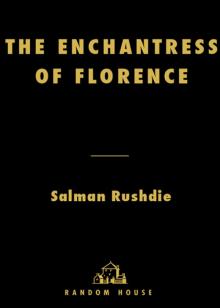 The Enchantress of Florence
The Enchantress of Florence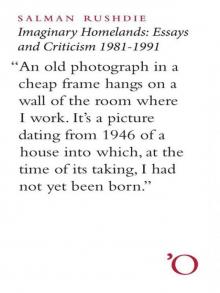 Imaginary Homelands: Essays and Criticism 1981-1991
Imaginary Homelands: Essays and Criticism 1981-1991 Joseph Anton: A Memoir
Joseph Anton: A Memoir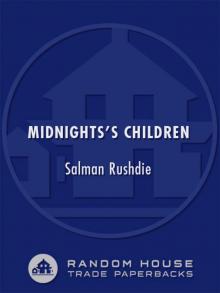 Midnight's Children
Midnight's Children East, West: Stories
East, West: Stories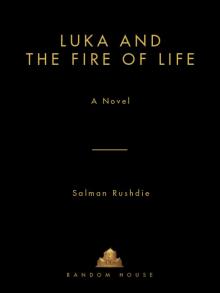 Luka and the Fire of Life
Luka and the Fire of Life Fury Fury Fury
Fury Fury Fury Haroun and the Sea of Stories
Haroun and the Sea of Stories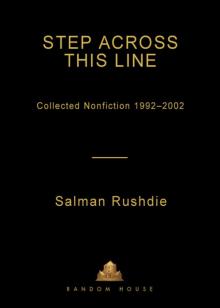 Step Across This Line: Collected Nonfiction 1992-2002
Step Across This Line: Collected Nonfiction 1992-2002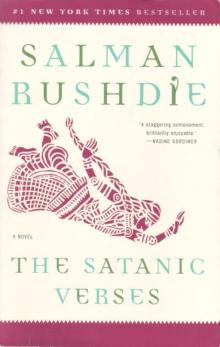 The Satanic Verses
The Satanic Verses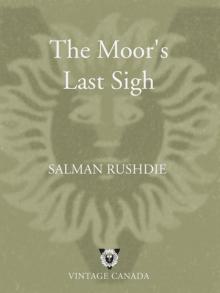 The Moor's Last Sigh
The Moor's Last Sigh The Prophet's Hair
The Prophet's Hair The Ground Beneath Her Feet
The Ground Beneath Her Feet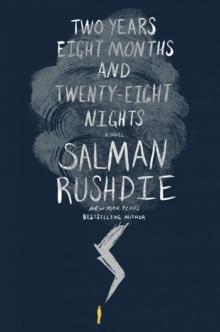 Two Years Eight Months and Twenty-Eight Nights
Two Years Eight Months and Twenty-Eight Nights Shalimar the Clown
Shalimar the Clown Grimus
Grimus The Duniazát
The Duniazát Fury
Fury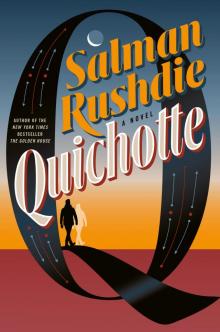 Quichotte
Quichotte The Jaguar Smile
The Jaguar Smile Joseph Anton
Joseph Anton Joseph Anton: A Memoir: A Memoir
Joseph Anton: A Memoir: A Memoir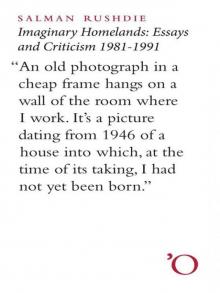 Imaginary Homelands
Imaginary Homelands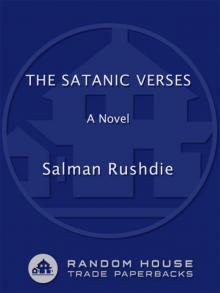 The Satanic Verses: A Novel
The Satanic Verses: A Novel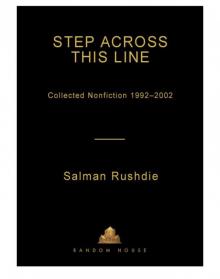 Step Across This Line
Step Across This Line East, West
East, West